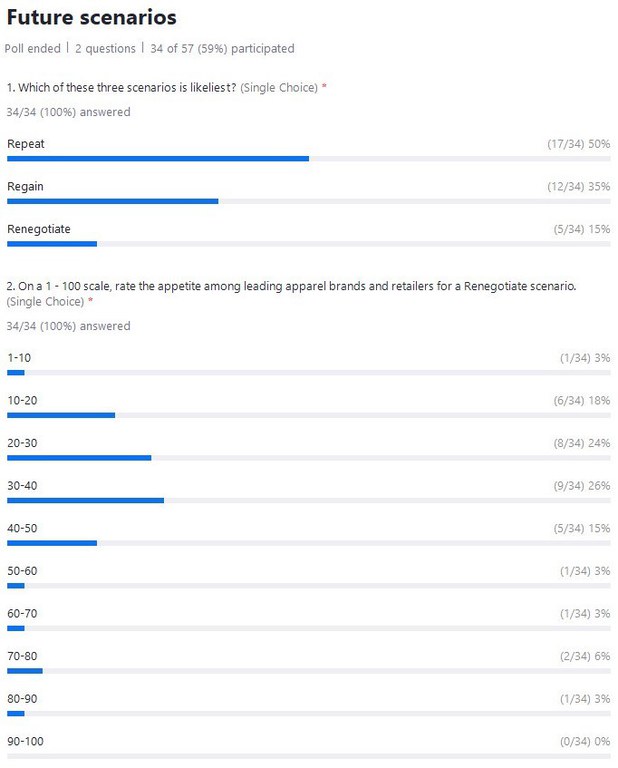Repeat, Regain or Re-negotiate? The post-COVID future of global apparel
The recent paper "Repeat, Regain or Renegotiate? The post-COVID future of global apparel", published by Cornell University and the International Labour Organization looks into these questions with a focus on scenarios that could emerge in the wake of the pandemic.
To further unpack the issues, Cornell University recently invited four experts to debate and discuss whether the apparel industry will repeat the same mistakes, recover and regain with new momentum, or renegotiate a new and improved business model?
The Asia Garment Hub has captured the key moments from that discussion here!
On current retail consolidations in the fashion industry…
“Consolidation [of the apparel industry after Covid-19] provides a great opportunity because it essentially means stability in the relationships between entities, and that helps create an environment of standards for mutual benefit. If that also has an impact on labour, not only on the buyer and the supplier, but also on the stability of the work force and the reduction of (worker) turnover through better standards, then consolidation is good for companies overall.”
Anannya Bhattacharjee (Asia Floor Wage Alliance)
On the risks and opportunities of technological change…
“When we look at the trends on technological change [and consolidation], these can be opportunities, but they need to be harnessed with policy measures to make sure that they also benefit the most vulnerable workers. These often tend to be young migrant women in the global garment industry. It's very important to be proactive from a policy perspective and not assume that things will fall into place for every worker even if the right decisions are taken.” Arianna Rossi (ILO Better Work)
On how climate and decent work concerns need to be tackled in tandem...
“With climate change, we're going to see even more shocks to the system. We need a holistic approach, we need to move from reactive to proactive, and that may seem very simple, but if you look at the history of our industry, everything is piecemeal in terms of disaster planning. The industry needs to come together and we need to figure out how to raise awareness and balance the climate issue with human rights and labour conditions. The government is key to this collaboration, which we all need to look at as at least one piece of the puzzle.”
Cara Chacon of Intentum Consulting (formerly Patagonia)
On the limitations of voluntary due diligence...
“There's a saying if we don't learn from history, we're going to repeat it. Voluntary mechanisms [for human and labour rights due diligence in the supply chain] have not worked because those who are going to do the right things are going to do the right things anyway. What we need is mandatory legislation and we need to move towards that and start building on that momentum.” Naureen Chowdhury (Laudes Foundation)
On the importance of inclusive dialogue for industry improvement…
“There is an opportunity that comes from labour provisions in trade agreements or from the mandatory human rights due diligence - these are constructs that provide an entry point for stronger public regulation. These efforts will still raise questions unless they are really anchored at the local level, in inclusive dialogue among all the actors that will regulate working conditions at that local level.” Arianna Rossi (ILO Better Work)
On the need for supply chain accountability…
"We need to identify incentives for accountability. The incentives can be a fear factor or better disclosure. We need to push the envelope as far as we can because otherwise there is a natural tendency to settle for the most comfortable lowest common denominator. The fact that the new Vietnamese agreement includes labour provisions is a step in the right direction. How it will play out is another matter."
Naureen Chowdhury (Laudes Foundation)
On the role of legislation in the apparel industry....
“The only answer is that there needs to be legislation that puts everyone in their place and is like a shock to the system. I'm not an advocate of legislation, but there has to be enough to get all the players to do the right thing, and until we get the smaller brands on board, it's going to be hard to mitigate any of the issues that are outlined in the paper.” Cara Chacon of Intentum Consulting (formerly Patagonia)
COVID-19 seems to be accelerating the intensity and urgency of key issues facing the industry. Which of the post-Covid scenarios are most likely in your view: Repeat, Regain or Re-negotiate?
“The fact that we're all here is that we don't want to go back to a repeating scenario that didn't do anybody any good. I honestly think: How can we stand up to power and build the pressure points and levers that will help us renegotiate?” Naureen Chowdhury (Laudes Foundation)
“COVID-19 was a big test for the supply chain, even if we don't take labour into account, but just looking at the businesses side, it was a big cold shower to realize that this supply chain is just not sustainable, it's not organized the way it should be. It has to be about giving a voice to the most vulnerable and finding ways to more effectively renegotiate the existing imbalance of power. It's not just a question of the speed of change, it's a question of the equity of change and what we hope to see -a much more equitable outcome for all involved.” Arianna Rossi (ILO Better Work)
“With the onslaught that's coming on climate tracks as well, we're going to have no choice, so I think renegotiating is the only option.” Cara Chacon of Intentum Consulting (formerly Patagonia)
“I think it's about pushing back against the power imbalance that defines inequality or climate breakdown. One of the ways to do that is to create tools for better movement-building and collective action, and I think that's a step in the right direction. It's bringing everyone together to identify what are the common risks that threaten us and what unites us, whether it's climate justice or labour justice - it's all intertwined, so let's renegotiate.”
Naureen Chowdhury (Laudes Foundation)
In your view, what is the most urgent change needed in the sector now?
“We need a multi-sector collaboration approach. Nobody can do this alone. My call for action would be to come together as an industry and solve the problems that workers are facing.”
Cara Chacon of Intentum Consulting (formerly Patagonia)
“A re-distributed and more equitable global supply chain. Currently, most of the value in the global supply chain flows from the country of production to the brands' home countries. A re-distributive element that brings value back to the producing countries is necessary.” Anannya Bhattacharjee (Asia Floor Wage Alliance)
“It has to be about having everybody around the table and not assuming that global actors can figure it all out without including producing country governance and local actors as meaningful partners.” Ariana Rossi (ILO Better Work)
“For me, it's all about mandatory regulations. I see them as a tool for democratization and we need to potentially evolve through mandatory changes.” Naureen Chowdhury (Laudes Foundation)
See the results of the audience poll (Which future scenario of the paper is most likely?) conducted during the debate: 

